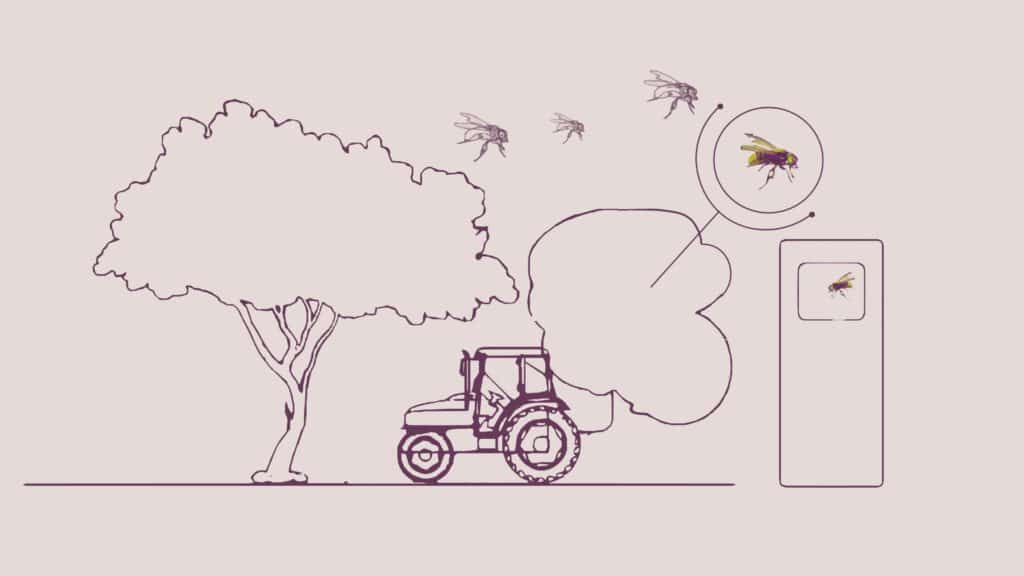Biocontrol offers a sustainable alternative for crop protection, utilizing living organisms or natural substances to combat pests. This method promotes ecosystem balance and reduces dependency on chemical products, aligning agricultural practice with the principles of sustainability, food safety, and environmental protection.
Introduction to Biocontrol
Biocontrol represents an innovative and environmentally-friendly approach in the field of crop protection. Indeed, it is distinguished by the strategic use of living organisms or natural substances to regulate pest populations and maintain the balance of agricultural ecosystems.
Unlike conventional methods that heavily rely on chemical products, biocontrol leverages natural biological interactions to prevent, suppress, or reduce damage caused by pests, weeds, and pathogens.
This holistic approach thus favors integrated pest management, which aims to limit environmental disturbances while preserving the health of crops and biodiversity. Furthermore, biocontrol fully embraces a sustainability logic, contributing to the transition towards more resilient and resource-efficient agricultural systems, while meeting the increasing demands for food safety and environmental protection.
The Main Principles
Biocontrol is based on a diversity of approaches, among which four main types stand out: the use of natural substances, microorganisms, macroorganisms, and chemical mediators. Let’s focus on the latter, on chemical mediators, which play a crucial role in chemical ecology, a field of study that explores interactions based on chemical signals between insects and their environment. These signals, also known as pheromones or kairomones, are key elements in the silent dialogues that govern the behavior and survival of insects.
Pheromones, first, are molecules emitted by an individual that trigger specific responses in another individual of the same species. Conversely, ectomones, which are divided into allomones, kairomones, and synomones, act on organisms of different species. Allomones are beneficial for the emitter but harmful for the receiver, while kairomones are beneficial for the receiver but harmful for the emitter. As for synomones, they benefit both the emitter and the receiver. These distinctions reveal the complexity of chemical interactions between species. (For more on this topic, we invite you to read our post on VOCs: https://bit.ly/3THTtLd)
Pheromones, in particular, are exploited for intra-species communication and offer fascinating examples of evolutionary adaptations. They are also used in R&D for pest control solutions, notably in the context of sexual confusion. On the other hand, kairomones illustrate signals emitted by one species that benefit another, such as the emblematic case of the olive tree and the olive fly. In this scenario, the tree emits signals attractive to the fly, thus favoring its approach to the fruit, providing a striking example of the subtlety of ecological interactions based on chemical signals. This is the method adopted by Cearitis, which we will examine in more detail in the following paragraphs.
The Benefits of This Solution
Biocontrol offers numerous advantages, particularly in terms of environmental sustainability and its positive impact on food quality and safety.
It is very likely that you are already aware of issues related to the disappearance of pollinators, as well as the reduction in biodiversity in our crops, and the degradation of soil health. These problems largely stem from the repeated use of chemical products such as pesticides and fungicides. Moreover, we can question the effects of these products on the health of producers. Frequent exposure to pesticides and other chemicals can pose a risk to their health.
On the other hand, biocontrol solutions promote more sustainable and environmentally friendly agricultural practices by focusing on the use of natural substances, microorganisms, macroorganisms, and chemical mediators. These alternative approaches offer a more balanced and ecological strategy for protecting crops while reducing risks to human health and the environment.
Furthermore, the debates and actions taken in recent years have particularly highlighted the impact of chemicals on food safety. By opting for biocontrol approaches, we can ensure safer and healthier food production and strengthen consumer confidence in the quality of agricultural products.
The Cearitis Case
Cearitis designs protection solutions for fruit crops, with the goal of responding in a concrete and respectful manner to the current challenges of agriculture. Our approach prioritizes innovation and eco-responsibility, by promoting agroecological practices while actively supporting farmers and rural communities to foster their prosperity.
Inspired by natural mechanisms, our company has developed a “push and pull” method. Our entomology specialists study the behavior of flies and identify the natural attractive and repulsive molecules involved in their interactions with fruit crops. This innovative approach, which mimics natural processes, offers sustainable and effective solutions.
Our repellent uses molecules similar to those emitted by fruit flies during their interactions with trees and fruits, which diverts their flight away from cultivated areas. At the same time, our autonomous trap releases attractive molecules to capture the diverted pests.
Thus, our solutions guarantee effective and environmentally respectful protection for fruit crops.

Challenges and Perspectives
The evolution of the biocontrol market in France reflects an encouraging trend. In 2022, the biocontrol market in France reached an estimated total of 278 million euros, recording a growth of more than 4% compared to the previous year when it was at 266 million euros, according to data published by IBMA France on September 27.
Several factors explain this growth. First, there is the increasing consumer demand for healthy and sustainable food products. Next, European regulation aimed at reducing the use of chemical pesticides plays a significant role. Moreover, the active support of the French government for the development of biocontrol through various plans could also contribute to this positive trend.
Conclusion
In conclusion, biocontrol represents an effective and environmentally friendly response to contemporary agricultural challenges. Its growing adoption is supported by an increasing demand for healthy and sustainable food products, as well as by regulations aimed at reducing the use of chemical pesticides. With companies like Cearitis developing innovative solutions, biocontrol offers sustainable and effective responses for protecting crops while preserving the health of ecosystems and consumers.
Definition:
- Weeds: Refers to a plant that grows in an environment where it was not intentionally introduced, commonly called “a weed”.
- Pathogens: Refers to something that causes disease.